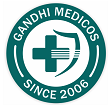Taffic Tablets for HIV Treatment

Table of Contents
Taffic Tablets Uses, Benefits and Side Effects
Taffic Tablets are a combination of antiretroviral medications prescribed for the treatment of HIV (human immunodeficiency virus) infection. It works by boosting the immune system’s ability to combat HIV, thereby managing or treating AIDS (acquired immunodeficiency syndrome).
This medication inhibits the growth of HIV in the body, reducing the risk of HIV-related complications and improving an individual’s life expectancy. You can take the medicine with or without food, but it’s important to take it at the same time each day to ensure its effectiveness. Missing a dose can have an impact on your recovery, so it’s vital to complete the full treatment course as directed by your doctor. Abruptly discontinuing the treatment may reduce the medication’s efficacy.
The most common side effects of this medicine include nausea, diarrhea, and headaches. These side effects usually resolve over time, but if they persist or become severe, it’s crucial to inform your doctor. This medication can also cause drowsiness or weakness, so it’s advisable to avoid activities like driving. Staying well-hydrated by drinking plenty of fluids can help manage these side effects.

Before starting treatment with Taffic Tablet, consult your doctor, especially if you are pregnant, breastfeeding, or have any pre-existing health conditions. Your doctor may recommend regular blood tests to monitor your blood counts, kidney and liver functions, and overall health. Additionally, inform your doctor about all other medications you are taking, as some drugs may interact with Taffic Tablet.
In the world of medicine, innovation has been the key to addressing some of the most challenging health concerns. When it comes to HIV treatment, the TAFFIC Tablet has emerged as a beacon of hope for millions. In this article, we will explore the composition, uses, and the impact it has in the treatment of HIV.
Composition
Taffic Tablets are a combination of three essential drugs:
- Bictegravir (50mg)
- Emtricitabine (200mg)
- Tenofovir Alafenamide (25mg)
This unique blend of pharmaceutical components forms the backbone of HIV treatment.
Packaging Size
Taffic Tablets are available in a packaging size of 30 tablets. This ensures that individuals have a sufficient supply for their prescribed treatment regimen.
Human Immunodeficiency Virus (HIV) is a formidable adversary in the realm of infectious diseases. HIV attacks the body’s immune system, specifically the CD4 cells, making it difficult for the body to fight off infections. Without treatment, HIV can lead to the disease known as acquired immunodeficiency syndrome (AIDS). However, with the advent of medications like Taffic Tablets, living a healthy life with HIV has become a reality for many.
Taffic Tablets come in a convenient tablet form, making it easy for individuals to take their medication as prescribed. This user-friendly format enhances adherence to the treatment plan, ensuring the best possible outcome.
Hetero, the manufacturer of Taffic Tablets, is a pharmaceutical company committed to providing high-quality medications for various health conditions. With a reputation for excellence and a focus on innovation, Hetero plays a crucial role in advancing HIV treatment.

How Taffic Tablets Work?
Taffic Tablets work through a multifaceted approach to combat HIV. Let’s delve into the mechanism of action of each of the components:
- Bictegravir: This drug is an integrase strand transfer inhibitor (INSTI), which prevents the integration of the HIV virus into the DNA of the host CD4 cells.
- Emtricitabine: It is a nucleoside reverse transcriptase inhibitor (NRTI) that inhibits the reverse transcriptase enzyme, essential for the replication of the virus.
- Tenofovir Alafenamide: Also an NRTI, this drug effectively suppresses the replication of HIV by blocking the reverse transcriptase enzyme. It is important to note that Tenofovir Alafenamide is a newer prodrug of Tenofovir, which is associated with fewer side effects and better tolerability.
Adhering to the prescribed regimen of Taffic Tablets is critical for the success of HIV treatment. Skipping doses or not taking the medication as directed can lead to the development of drug resistant strains of the virus. Therefore, it is imperative for individuals to follow their healthcare provider’s guidance diligently.
Conclusion
In the battle against HIV, Taffic Tablets represent a significant advancement in medical science. With its combination of Bictegravir, Emtricitabine, and Tenofovir Alafenamide, this medication offers hope to those living with HIV. Its user-friendly tablet form and the credibility of the manufacturer, Hetero, ensure that patients receive a reliable and effective solution.


 Anti Cancer Drugs
Anti Cancer Drugs Hepatitis C
Hepatitis C Meds for HIV
Meds for HIV Ayurvedic Medicine
Ayurvedic Medicine Transplant Medicine
Transplant Medicine Respiratory System
Respiratory System +91-9999064250 / 9811604424 / 9811604444
+91-9999064250 / 9811604424 / 9811604444
 8(800)100-47-90
8(800)100-47-90
